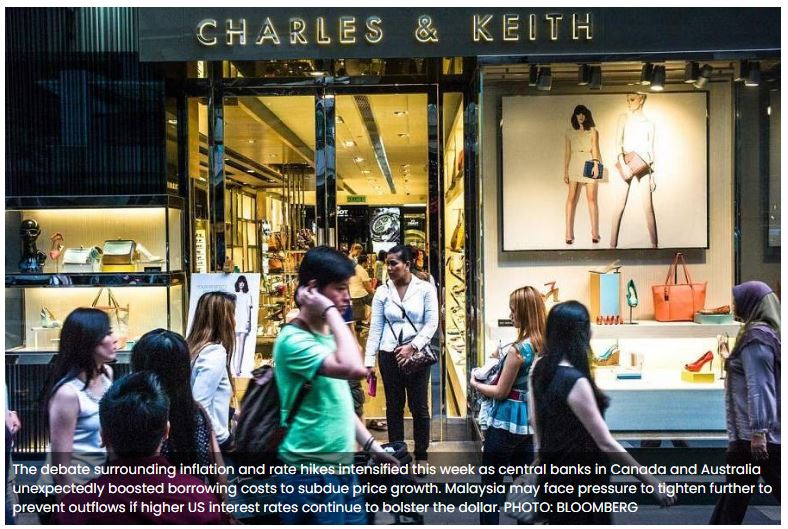Malaysian inflation isn’t misbehaving, central banker says
MALAYSIA’S inflation currently isn’t misbehaving, giving the central bank room to keep up its “conditional pause,” according to a senior official.
“If it’s food prices and all the supply shocks, we have a history of seeing through those shocks,” Bank Negara Malaysia’s Assistant Governor Fraziali Ismail said in an interview with Bloomberg Television on Thursday (Jun 8). “What matters is how it stokes demand. At this juncture, again, we don’t see for inflation to misbehave in Malaysia.”
When asked if there is a case to continue hiking rates, Fraziali said “that depends on how inflation behaves.” Fraziali, who’s worked at the central bank for almost three decades, reiterated the central bank’s 2023 average inflation forecast of between 2.8 per cent and 3.8 per cent in the interview in Kuala Lumpur.
“What we have seen so far, I’ve mentioned earlier, inflation was a function of both supply and demand,” Fraziali said. “We have seen, for example, demand-driven inflation staying quite strong at this juncture. We don’t have an inflation problem.”
The debate surrounding inflation and rate hikes intensified this week as central banks in Canada and Australia unexpectedly boosted borrowing costs to subdue price growth. Malaysia may face pressure to tighten further to prevent outflows if higher US interest rates continue to bolster the dollar.
Malaysia’s central bank has raised interest rates five times in the past year, with a surprise hike early last month bringing borrowing costs back to pre-pandemic levels. Policymakers warned then that inflation may flare up again, with commodity prices and an adjustment in subsidies among the factors to watch.
“Many central banks have taken the step, us included, to have an intermittent pause, to reevaluate what has been the effects of our measures on the economy,” said Fraziali, who also sits on BNM’s monetary policy committee. “In a way, when we do a conditional pause, let me stress it is a conditional pause – it depends on incoming data as well.”
A policy pause in Malaysia will offer the economy some relief as analysts predict that the pace of expansion will slow to 4.2 per cent this year from 8.7 per cent in 2022. Traders think the rate-hike cycle has ended, with ringgit one-year, one-day swaps reflecting bets that the BNM will stand pat over the next 12 months.
Still, an impending reduction in subsidies may rekindle price pressures, and Fraziali noted inflation depends on subsidy timing. Moody’s Investors Service has warned that a heat wave could translate into faster food inflation and another interest-rate hike.
Fraziali said authorities are also monitoring the impact of swings in the exchange rate on inflation. The ringgit has weakened more than 4.5 per cent this year, the worst performance among emerging Asian currencies, as rising US interest rates supported the greenback.
“We have to watch precisely the impact of that on inflation and on the economy,” he said when asked if he was comfortable with the ringgit’s current level.
On the growth outlook, Fraziali ruled out Malaysia entering a recession or a “fundamental slowdown of the economy.”
“The economy has recovered. It’s back to pre-pandemic levels, it’s chugging along nicely,” he said. Bank Negara Malaysia had previously forecast the economy will expand between 4 per cent and 5 per cent this year.
While China’s slowdown may affect the country, Malaysia has other sources of growth, he added. At the same time, faster recovery from China poses an upside risk to Malaysia, he said. Malaysia expects to benefit from Chinese tourist arrivals in the second half of the year. BLOOMBERG


 English
English




